|
|
|
Sort Order |
|
|
|
Items / Page
|
|
|
|
|
|
|
| Srl | Item |
| 1 |
ID:
086938
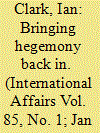

|
|
|
|
|
| Publication |
2009.
|
| Summary/Abstract |
Hegemony suffers from a bad press. It is currently used to refer simply to United States primacy. Thus presented, the US is considered to have been hegemonic since 1945, or at least since 1990. Instead, hegemony is presented here as a legitimate institution of international society in which special rights and responsibilities are conferred on the hegemon. No such hegemony exists at present. However, given today's constellation of power, a circumscribed US hegemony potentially has a distinctive contribution to make to contemporary international order. To map out such a hegemonic institution, this article reviews some historical precedents. It finds that, rather than uniform, these have taken a variety of forms, especially with respect to the scope of the legitimacy and constituency within which they have operated. A scheme of hegemonies-singular, collective and coalitional-is set out as a more realistic way of thinking about hegemony's present potential.
|
|
|
|
|
|
|
|
|
|
|
|
|
|
|
|
| 2 |
ID:
086942
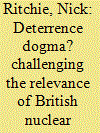

|
|
|
|
|
| Publication |
2009.
|
| Summary/Abstract |
In December 2006 the British government released a White Paper announcing its intention to begin the process of replacing its current Trident nuclear weapons system, thereby allowing it to retain nuclear weapons well into the 2050s. In March 2008 the government released its National Security Strategy that stressed the long-term complexity, diversity and interdependence of threats to British security with a clear focus on human rights, justice and freedom. This article asks how the threat to kill tens if not hundreds of thousands of people with British nuclear weapons fits into the National Security Strategy's world view and questions the relevance of an instrument of such devastating bluntness to threats defined by complexity and interdependence. It argues that the government's case for replacing the current Trident system based on the logic of nuclear deterrence is flawed. First, Britain faces no strategic nuclear threats and the long-term post-Cold War trend in relations with Russia and China-the two nuclear-armed major powers that could conceivably threaten the UK with nuclear attack-is positive, despite current tensions with Moscow over Georgia. Second, the credibility and legitimacy of threatening nuclear destruction in response to the use of WMD by 'rogue' states is highly questionable and British nuclear threats offer no 'insurance' or guarantee of protection against future 'rogue' nuclear threats. Third, nuclear weapons have no role to play in deterring acts of nuclear terrorism whether state-sponsored or not. Fourth, British nuclear threats will be useless in dealing with complex future conflicts characterized by 'hybrid' wars and diverse and interdependent sources of insecurity. The article concludes by arguing that the government's fall-back position that it must keep nuclear weapons 'just in case' because the future security environment appears so uncertain, makes no sense if British nuclear threats offer no solution to the causes and symptoms of that uncertainty.
|
|
|
|
|
|
|
|
|
|
|
|
|
|
|
|
| 3 |
ID:
086939
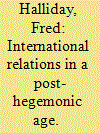

|
|
|
|
|
| Publication |
2009.
|
| Summary/Abstract |
In his valedictory lecture, concluding twenty-five years teaching at the London School of Economics and Political Science, Fred Halliday examines three aspects of the changing reality and intellectual context of International Relations. Placing a broad interpretation on the concept of the 'post-hegemonic' he looks at the changing nature of American power, the growing diversity of, and challenges to, the discipline of International Relations, and the mixed record of different conceptions of internationalism. This lecture is a reassertion of the necessity and vitality of academic reflection on International Relations, a challenge to much conventional thinking on issues of globalization, and a reassertion of the need for, and complexity of, a commitment to global values.
|
|
|
|
|
|
|
|
|
|
|
|
|
|
|
|
| 4 |
ID:
086940


|
|
|
|
|
| Publication |
2009.
|
| Summary/Abstract |
President Obama has been elected to office in the United States during a crisis of confidence in America's capacity to exercise effective leadership in world afairs. National self-indulgence, greedy financial irresponsibility and an unnecessary war have discredited that leadership, a situation that has been compounded by the current global economic crisis. Added to these self-inflicted wounds, this article suggests, are two transformational developments on the world political scene. First, the 'global political awakening' to issues such as climate change, health and social inequality; and second, a shift in the distribution of global power from the West to the East. However, although this shift is occurring, it is a slow process and in the foreseeable future there is no state, or combination of states, that can replace the role America plays on the international scene. What is also clear is that without an American recovery, there will be no global recovery. The American recovery will be a monumental task. But four small, telling words—unify, enlarge, engage and pacify—summarize the essence of the needed response. There needs to be an effort to re-establish a sense of unity between America and Europe; an enlarged coalition of principal players is necessary to promote more effective global management; dialogue engaging a wider circle of partners key to global geopolitical stability should be promoted and maintained; and a deliberate effort not to get bogged down politically and militarily in the Middle East is essential.
|
|
|
|
|
|
|
|
|
|
|
|
|
|
|
|
| 5 |
ID:
086943
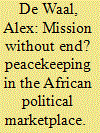

|
|
|
|
|
| Publication |
2009.
|
| Summary/Abstract |
Since the mid-1990s the UN, in tandem with major western powers, has embarked upon an ambitious effort of peace support operations in Africa. The results of what we may call the 'Annan experiment' are not yet in. But there are good reasons to fear that, in many African countries, such peace operations have defend normative outcomes that are beyond realistic expectation, so that they can never hope to 'succeed'. This article examines the political and economic functioning of fragile African states using the lens of a 'political marketplace' in which local elites seek to obtain the highest reward for their loyalty, over short time horizons, within patrimonial systems. In such systems, political institutions are incapable of managing confect, which means that standard peacemaking efforts and peacekeeping operations do not align with domestic possibilities for settlement. To the contrary, external engagements can so distort domestic political markets that they obstruct national political bargaining and result in an open-ended commitment to peacekeeping in countries such as the Democratic Republic of Congo and Sudan.
|
|
|
|
|
|
|
|
|
|
|
|
|
|
|
|
| 6 |
ID:
086944
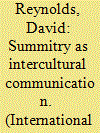

|
|
|
|
|
| Publication |
2009.
|
| Summary/Abstract |
Summitry is regularly in the news, most recently because of the G20 meeting in Washington DC in November 2008. This article explores the sometimes neglected cultural dimensions of summitry, drawing on recent work by cultural international historians and by theorists of intercultural communication, much of which addresses western relations with Asia. This article, however, argues that all international summitry is an intercultural act. Three historical case-studies are explored: Chamberlain and Hitler in 1938, Kennedy and Khrushchev in 1961 and Reagan and Gorbachev in 1985. In each case, cultural perceptions and expectations played a significant part in the outcome of the summit. The article also comments on the role of translation in international summitry.
|
|
|
|
|
|
|
|
|
|
|
|
|
|
|
|
| 7 |
ID:
086941
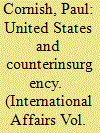

|
|
|
|
|
| Publication |
2009.
|
| Summary/Abstract |
According to the status of forces agreement signed by Iraq and the United States in November 2008, US troops are to be withdrawn entirely from Iraq by the end of 2011. A few days later it was also revealed that the British force in Iraq, numbering about 4,100 troops, will be reduced to a contingent of just a few hundred military advisors by summer 2009. The counterinsurgency campaign in Afghanistan, on the other hand, is to be intensified in the form of a 'surge' in military and political effort. Counterinsurgency operations in both Afghanistan and Iraq have long been at the centre of the security policy debate in the United States and elsewhere; a debate which seems unlikely to be resolved in the near future. But what exactly is counterinsurgency? This article offers some reflections on the practice and the politics of an especially complex form of military engagement. All military activity should be understood through the prism of politics, and counterinsurgency particularly so.
|
|
|
|
|
|
|
|
|
|
|
|
|
|
|
|
| 8 |
ID:
086937
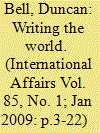

|
|
|
|
|
| Publication |
2009.
|
| Summary/Abstract |
In order to grasp some of the key intellectual developments and trends that shaped the global politics of twentieth century and continue to shape our own world-neo-classical economics, modernization theory, deterrence theory, the democratic peace, among others-it is necessary to explore the history of the human sciences. It is important, in other words, to examine the role of the modern research university in producing and diffusing ideas about the self, society, the economy and world order. International Relations (IR), and political science more generally, played a significant role in this story. In recent years we have seen a growth of interest in the history of IR, though it is still an underdeveloped area of research. Among other things, scholars have shown that many of the foundational myths of the discipline-the views that inform textbook understandings of the past and present-are deeply flawed. This article first surveys this recent work, highlighting its strengths and weaknesses, and then proceeds to offer some thoughts on future directions for research. It identifies a range of questions and topics that have yet to be adequately addressed, and draws on the latest methodological work in intellectual history, highlighting some new interpretative approaches that can enrich scholarship in this area.
|
|
|
|
|
|
|
|
|
|
|
|
|
|
|
|
|
|
|
|
|